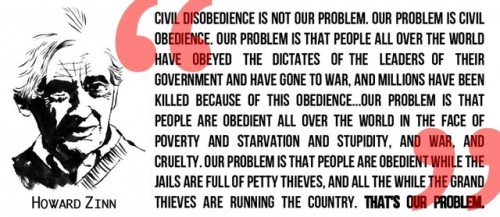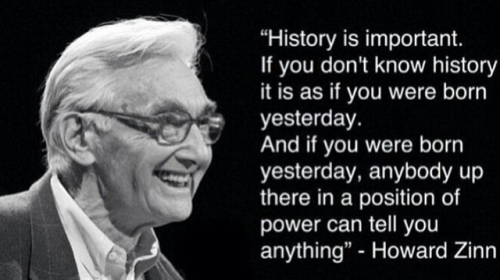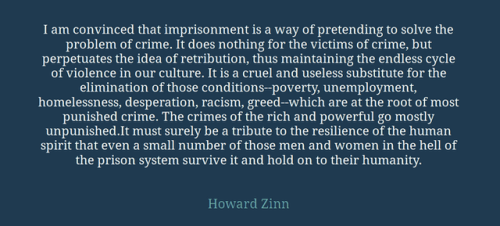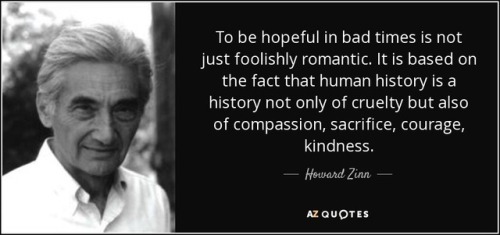#howard zinn
Howard Zinn (August 24, 1922 – January 27, 2010) was an American historian, professor, and social activist. Zinn grew up in Brooklyn in a working-class, immigrant household. His life’s work focused on a wide range of issues including race, class, war, and history, and touched the lives of countless people. He wrote the influential A People’s History of the United States, and his memoir You Can’t Be Neutral on a Moving Train. From 1956 to 1963, he taught at Spelman College where he became active in the Civil Rights Movement and was eventually fired because of his involvement in the black freedom movement.
“Feminism/womanism never seemed odd to Howard Zinn, who encouraged his Spelman students, all of them women, to name and challenge oppression of any sort.
I was Howard’s student for only a semester, but in fact, I have learned from him all my life. His way with resistance—-steady, persistent, impersonal, often with humor—-is a teaching I cherish.”-Alice Walker
Before he died, Zinn stated that he would like to be remembered “for getting more people to realize that the power which rests so far in the hands of people with wealth and guns, that the power ultimately rests in people themselves and that they can use it. At certain points in history, they have used it. Black people in the South used it. People in the women’s movement used it. People in the anti-war movement used it. People in other countries who have overthrown tyrannies have used it.”
Post link
As people take to the streets of NYC on December 13th to protest institutionalized racism and police brutality, they stand in solidarity with the Black community in a struggle older than this country. It is important for individual participants to reflect on what brings them to the march and what the specific issues are. Below you’ll find ten quotes that may help you through the process. 
On Police and State Violence
“The announced function of the police, “to protect and serve the people,” becomes the grotesque caricature of protecting and preserving the interests of our oppressors and serving us nothing but injustice. They are there to intimidate blacks, to persuade us with their violence that we are powerless to alter the conditions of our lives. Arrests are frequently based on whims. Bullets from their guns murder human beings with little or no pretext…” - Angela Davis
On Social Responsibility
“…this majority is you. Nobody else can do it. The world is before you, and you need not take it or leave it as it was when you came in.” - James Baldwin
On Civil Disobedience
“Protest beyond the law is not a departure from democracy; it is absolutely essential to it.” -Howard Zinn
On Solidarity
“I don’t believe in charity. I believe in solidarity. Charity is so vertical. It goes from the top to the bottom. Solidarity is horizontal. It respects the other person. I have a lot to learn from other people.”-Eduardo Galeano
The Collective
"I propose that there is another kind of power based not on resources, things, or attributes, but rooted in the social and cooperative relations in which people are enmeshed by virtue of group life.” - Frances Fox Piven
On Community, Justice, and Privilege
“If we want a beloved community, we must stand for justice, have recognition for difference without attaching difference to privilege.”― bell hooks
Feminism Is It
“Feminist focus on women finding a voice, on the silence of black women, of women of color, has led to increased interest in our words. This is an important historical moment. We are both speaking of our own volition, out of our commitment to justice, to revolutionary struggle to end domination, and simultaneously called to speak, "invited” to share our words. It is important that we speak. What we speak about is more important.“ - bell hooks
On the power of the victim
"The victim who is able to articulate the situation of the victim has ceased to be a victim: he or she has become a threat.” — James Baldwin
Long Overdue
“And so we must say, now is the time to make real the promises of democracy. Now is the time to transform this pending national elegy into a creative psalm of brotherhood. Now is the time to lift our nation. Now is the time to lift our nation from the quicksands of racial injustice to the solid rock of racial justice. Now is the time to get rid of segregation and discrimination. Now is the time” – Dr. Martin Luther King Jr.
On the distance
“Colorful demonstrations and weekend marches are vital but alone are not powerful enough to stop wars. Wars will be stopped only when soldiers refuse to fight, when workers refuse to load weapons onto ships and aircraft, when people boycott the economic outposts of Empire that are strung across the globe.” – Arundhati Roy





